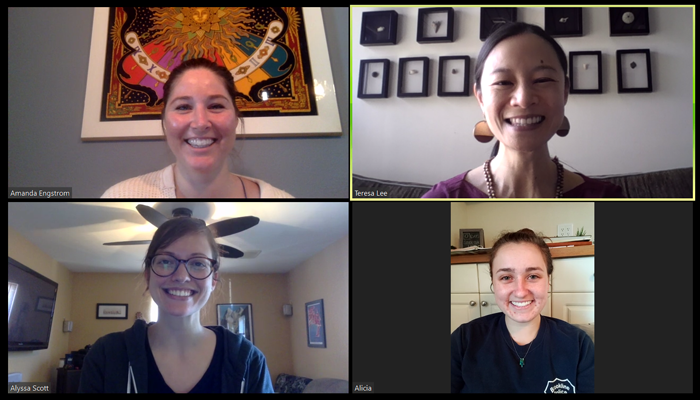Guest post by Alyssa Scott, Amanda Engstrom, and Teresa Lee.
As scientists, we know that social distancing is the best way to combat COVID-19. But as human beings, we’ve found that social distancing is an efficient way to quickly drain our mental health. We have a friend who, Castaway-style, puts a sticky note on the wall for each day she’s been distancing. Others are talking to their pets much more frequently than they did before. And some have veered to the opposite extreme, by training for a marathon while taking a cooking class and re-painting their spare room before lunch. Although we finally have the time to tackle our endless to-do lists, actually doing so feels harder than ever. As research trainees in isolation, we’ve realized that structure is a crucial component of our success and sanity. So, to structure our new normal, we decided to meet daily online to check in with each other and work towards our goals.
Welcome to Write Club. The first rule of Write Club is: you do not talk about Write Club. We meet via Zoom each weekday at 11 am. The first fifteen minutes are set aside for chatting, which typically includes updating each other on new permutations of isolation spiraling, showing off dogs on camera, or checking on lab business for our mouse colony. In case you’re wondering, our group is split on whether Write Club warrants wearing real clothes (the quorum is that it doesn’t). We finish our chat by stating our intentions for the next ninety minutes of working time. We then mute our audio, turn off our cameras, and work. At the end, we reconvene for another fifteen minutes of debriefing, where we often share our screens to show our progress.
The other half of Write Club is our commitment to at least ten hours of focused writing each week. By Friday, each of us will have accumulated 7.5 hours through the Zoom meetings, so participation does require individual work, outside of our other online meetings, classes, and seminars. We know that ten hours is a modest goal, since we’re used to working much longer hours in the lab. But we’ve found that it’s been much harder to focus on academic work, with the situation as it is. To keep Write Club challenging, we plan to increase our hourly commitment as we get more comfortable with working in isolation.
One central element of Write Club is our documentation: using a shared Google Sheet, we keep track of our earned gold stars (which are really just asterisks entered into the spreadsheet). Because we have a wide range of goals, each person defines their own rules: a star could be earned from an hour of writing, two hours of editing, or reading one paper – the idea is to incentivize tasks that you’d normally find yourself avoiding. And, because we know first-hand the perils of procrastination, stars can only be earned proactively, not retroactively. Once a week has passed, you can no longer add stars to that week, but you are allowed to bank stars up for the future. You may have noticed that accountability is an important theme of Write Club. Knowing that we are all working “together” helps keep us motivated and focused on our goals. And of course, a little competitive spirit doesn’t hurt either. Documenting our work for others to see encourages us to keep making progress, even if it’s slower than we’re used to. And one does get questioned if they’ve missed Write Club, partly with concern and partly with good-natured ribbing.
Write Club has re-introduced some of the daily routine that we’ve missed while social distancing. And an important aspect of that routine isn’t even work-related – seeing each other daily allows us to check in with our friends about how they’re doing, which has become even more important in isolation. Before the pandemic, we took for granted how our casual interactions in the lab actually helped cultivate a strong sense of community. At least for these few hours, life feels close to normal. Then after Write Club’s done for the day, we can add a new sticky note to the wall.
About the authors:
The authors are all research trainees in the lab of David Katz at Emory University. Alyssa Scott is a PhD candidate in Genetics and Molecular Biology. She is interested in a career in science policy and advocacy, and enjoys reading and hiking in her spare time. Amanda Engstrom is a PhD candidate in the Biochemistry, Cell, and Developmental Biology program. Her research interests focus on the role of epigenetic regulation in neurodegenerative disease.Teresa Lee is an IRACDA Postdoctoral Fellow interested in chromosomes, C. elegans, and science education. In the fall, she is excited to start her new position as an Assistant Professor of Biological Sciences at UMass Lowell. Find the authors on Twitter: @alyssas_cott, @AmandaKEngstrom, and @snickclunk.
















